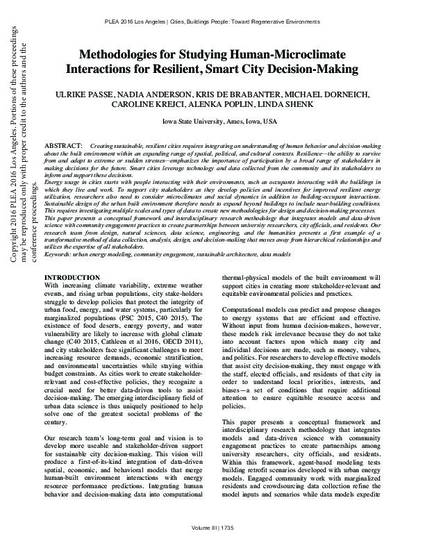
Creating sustainable, resilient cities requires integrating an understanding of human behavior and decision-making about the built environment within an expanding range of spatial, political, and cultural contexts. Resilience—the ability to survive from and adapt to extreme or sudden stresses—emphasizes the importance of participation by a broad range of stakeholders in making decisions for the future. Smart cities leverage technology and data collected from the community and its stakeholders to inform and support these decisions. Energy usage in cities starts with people interacting with their environments, such as occupants interacting with the buildings in which they live and work. To support city stakeholders as they develop policies and incentives for improved resilient energy utilization, researchers also need to consider microclimates and social dynamics in addition to building-occupant interactions. Sustainable design of the urban built environment therefore needs to expand beyond buildings to include near-building conditions. This requires investigating multiple scales and types of data to create new methodologies for design and decision-making processes. This paper presents a conceptual framework and interdisciplinary research methodology that integrates models and data-driven science with community engagement practices to create partnerships between university researchers, city officials, and residents. Our research team from design, natural sciences, data science, engineering, and the humanities presents a first example of a transformative method of data collection, analysis, design, and decision-making that moves away from hierarchical relationships and utilizes the expertise of all stakeholders.
Available at: http://works.bepress.com/alenka-poplin/1/

This is a proceeding from PLEA 2016—Cities, Buildings, People: Towards Regenerative Environments, Proceedings of the 32nd International Conference on Passive and Low Energy Architecture 3 (2016): 1735. Posted with permission.